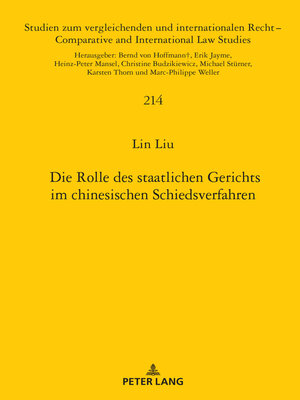Die Rolle des staatlichen Gerichts im chinesischen Schiedsverfahren
ebook ∣ Studien Zum Vergleichenden Und Internationalen Recht / Comparative and International Law Studies
By John Collins

Sign up to save your library
With an OverDrive account, you can save your favorite libraries for at-a-glance information about availability. Find out more about OverDrive accounts.
Find this title in Libby, the library reading app by OverDrive.



Search for a digital library with this title
Title found at these libraries:
| Library Name | Distance |
|---|---|
| Loading... |
What are drug courts? Do they work? Why are they so popular? Should countries be expanding them or rolling them back? These are some of the questions this volume attempts to answer. Simultaneously popular and problematic, loved and loathed, drug courts have proven an enduring topic for discussion in international drug policy debates. Starting in Miami in the 1980s and being exported enthusiastically across the world, we now have a range of international case studies to re-examine their effectiveness. Whereas traditional debates tended towards binaries like "do they work?", this volume attempts to unpick their export and implementation, contextualising their efficacy. Instead of a simple yes or no answer, the book provides key insights into the operation of drug courts in various parts of the world. The case studies range from a relatively successful small-scale model in Australia, to the large and unwieldy business of drug courts in the US, to their failed scale-up in Brazil and the small and institutionally adrift models that have been tried in England, Scotland, Wales and Ireland. The book concludes that although drug courts can be made to work in very specific niche contexts, the singular focus on them as being close to a "silver bullet" obscures the real issues that societies must address, including (but not limited to) a more comprehensive and full-spectrum focus on diverting drug-involved individuals away from the criminal justice system.







